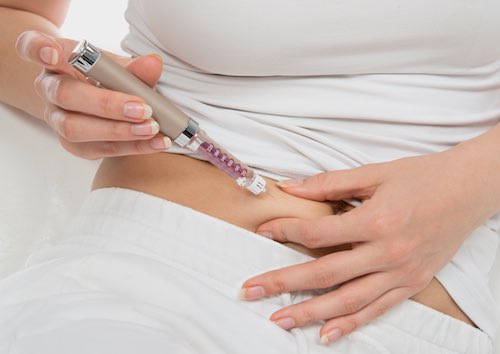Three out of every 10 Americans who have type 2 diabetes inject insulin. But sadly, only a few people start on insulin, as many people with type 2 diabetes think that only people with type 1 diabetes or only those people with type 2 who have failed to manage their blood glucose with everything else take insulin.
A survey of Australian adults with type 2 diabetes found that more than half believe that taking insulin means their diabetes has become worse and that insulin causes weight gain. Among Americans, the results are likely to be similar.

Negative beliefs
The majority of those people with these negative beliefs about insulin were wrong to think that taking insulin was the diabetes drug of last resort. Actually, insulin may give you the most control over your diabetes, if you aren’t ready yet to go on a very low-carb diet. And for several years some clinics have been prescribing insulin soon after diagnosis. It works.
But the people with type 2 diabetes with negative opinions about insulin were right to think that taking insulin usually leads to gaining weight.
My second book
Ten years ago when I wrote my second book, “Losing Weight with Your Diabetes Medication,” I emphasized that people with type 2 diabetes typically gain weight when they take insulin and cited two studies.
In one of these studies, 458 people with type 2 diabetes used insulin for six years, gaining more than 22 pounds. In the other study, people with type 2 diabetes gained more than 7 pounds in the first year alone.
Subsequent studies
A subsequent study of 2,272 people with type 2 diabetes from 12 countries found that after four years they had gained an average of 17 pounds. They added most of it—11 pounds—in the first year. But the amount of weight gain from insulin injections depended largely on the type of insulin that people use.
Another subsequent study of 7,759 people with type 2 diabetes was a meta-analysis of 16 randomized controlled trials. This study compared how different insulin regimes on affected body weight. It suggested that the lowest weight gain was seen with basal insulin.
The new study
A large study has now confirmed that people with type 2 diabetes typically gain only a little weight when they use a basal insulin. This prospective observational study involved about 200 physician offices in Germany that specialize in the care of people with type 2 diabetes.
The study identified 98,586 people with type 2 diabetes. A group of 113 people began their diabetes management by taking basal insulin, which the study identified as insulin glargine (Lantus, Toujeo, and Basaglar), insulin detemir (Levemir), and neutral protamine Hagedorn (NPH). Novo Nordisk sells NPH as Novolin N and Lilly as Humulin N.
Small weight gain
After a year on one of these basal insulins, the people with type 2 diabetes in this study averaged a much smaller weight gain than those in the earlier studies, which were of all the different insulin regimes. The people in the new study typically gained just over 2 pounds in their first year. The variation among the three types of basal insulin—glargine, detemir, and NPH—was “modest,” the study reported.
In the year that the researchers studied the basal insulin group, the people with type 2 diabetes made substantial reductions in their blood glucose levels. Their A1C levels dropped 1.8 percent, which typically meant reducing their A1C levels from 8.6 to 6.8.
The study’s aims
This new study had two aims. The first was to find the amount of weight gain the people had when they started basal insulin early after diagnosis. The second aim was to find what caused this weight gain.
The study’s authors suggested why the people in the new study gained so little weight compared with those in earlier studies of insulin use. In earlier studies, blood glucose typically had “already risen to an extreme level.” The people in the new study started with an average A1C of 8.6 and began taking insulin soon after they were diagnosed with diabetes.
Start basal insulin right after diagnosis
This new study confirms one that I reported here in 2014. Start basal insulin as soon as you know that you have type 2 diabetes. Taking it—far from being a strategy of last resort—needs to be you first resort.
This article is based on an earlier version of my article published by HealthCentral.
Never Miss An Update
Subscribe to my free newsletter “Diabetes Update”
I send out my newsletter on first of every month. It covers new articles and columns that I have written and important developments in diabetes generally that you may have missed.

